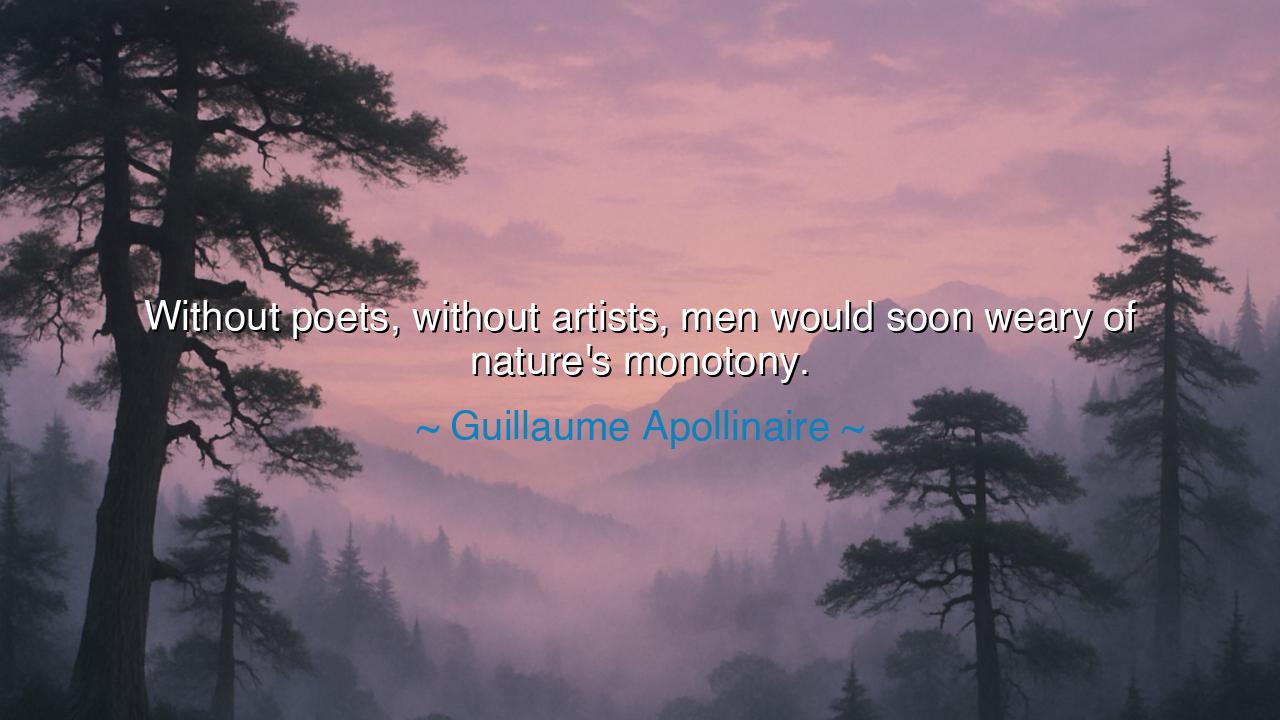
Without poets, without artists, men would soon weary of nature's






Hear the words of Guillaume Apollinaire, poet of fire and futurity: “Without poets, without artists, men would soon weary of nature’s monotony.” These words strike like a bell, awakening us to the truth that while the world is filled with mountains, rivers, and skies, it is the vision of the artist that prevents our eyes from dulling, our hearts from closing, our spirits from falling into indifference. For the poet does not invent beauty, but reveals it; the artist does not create the sun, but teaches us to marvel at its light.
The heart of this saying lies in the fragile nature of perception. Men pass daily by rivers and forests, yet in their haste, they fail to see. The tree becomes common, the sky unremarkable, the flower no more than a passing color. This is what Apollinaire calls nature’s monotony—not that creation is dull, but that the human heart, untrained in wonder, grows blind to its magnificence. Here enters the poet and the artist, who strike the soul awake, reminding it of the glory hidden in the ordinary.
History is rich with such awakenings. Consider the haiku masters of Japan, who could take a falling petal or the cry of a bird and turn it into eternity. Bashō, with seventeen syllables, could make a frog’s leap into a pond echo like thunder through the ages. Or recall Wordsworth, who stood before the daffodils and wrote of them so that all who read his lines would never again look at a field without sensing its quiet majesty. These men did not change nature—they changed us, making us capable of seeing it anew.
Even in times of great darkness, the artist rescues the soul from weariness. During the First World War, when Apollinaire himself was a soldier, surrounded by mud, death, and despair, it was poetry that lifted him beyond the trenches. Amid the ruin, he still found beauty in the human voice, in the rhythm of words, in the play of imagination. His declaration that without art men would tire of the world was not idle philosophy—it was born of fire, blood, and the desperate need for beauty in the face of horror.
The deeper meaning is this: poets and artists are not luxuries, but necessities. They are as vital to the spirit as bread is to the body. A society that silences its poets soon finds itself starved of joy, starved of vision, starved of meaning. And individuals who neglect art risk losing the ability to see the world as anything more than repetition. Without the artist, the sunrise is just light; with the artist, it becomes the eternal rebirth of hope.
The lesson is clear: cherish the artists, honor the poets. Do not think their work frivolous, for it is their vision that keeps life radiant. And if you yourself carry the gift of art, do not bury it. Write, paint, sing, create—not for riches alone, but to keep the souls of men awake. For every brushstroke and every stanza is a lantern in the night, reminding humanity that nature’s monotony is but the blindness of the spirit, and that beauty is inexhaustible when seen through the eyes of wonder.
Practical actions follow: read poetry, not as an academic exercise, but as nourishment for the heart. Visit galleries and listen to music, letting them sharpen your sight to the marvels of the world. Keep a journal, sketch the sunrise, write down the fleeting thoughts that stir in you when you walk among trees. For in these acts, you train your spirit to see what it once ignored. And in doing so, you become yourself a participant in the sacred task of keeping life radiant.
Remember always: without poets, without artists, men drift into weariness. But with them, the world is forever renewed. The river sparkles again, the flower sings, the sky becomes a canvas of infinity. Apollinaire’s words are a call to honor the guardians of vision, and to become, in our own way, guardians of wonder ourselves.






AAdministratorAdministrator
Welcome, honored guests. Please leave a comment, we will respond soon